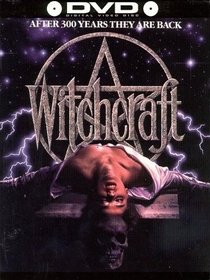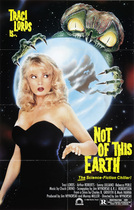Our editor-in-chief Nate Yapp is proud to have contributed to the new book Hidden Horror: A Celebration of 101 Underrated and Overlooked Fright Flicks, edited by Aaron Christensen. Another contributors include Anthony Timpone, B.J. Colangelo, Dave Alexander, Classic-Horror.com's own Robert C. Ring and John W. Bowen. Pick up a copy today from Amazon.com!
Witchcraft (1988)
As a small token of the problems that are inherent with trying to make a quality film on a miniscule budget like director Robert Spera's Witchcraft, notice that the title credits contain the word, "Origional." It's not the most serious gaffe, perhaps, but it's representative of the problems that plague this film -- which is not half as bad as its reputation has it -- namely, that the lack of budget resulted in a finished product that is two rewrites short of a decent script, two takes short of quality scenes, two razors short of effective editing, and two staves short of a good score.
There are more blatant indicators of a micro-budget, such as the cheesy home video-camera quality of the title lettering and the low-grade film stock (or possibly tweaked videotape), but neither of these factors would be indicative of a bad film in themselves. I've certainly sat through my share of no-budget, direct-to-video, "Hey, let's make a film in our back yard" horror films, and some of them are pretty good. Unfortunately, the cast and crew behind Witchcraft are not so brimming with natural talent that they can make a great film despite the traditional guerilla filmmaker disadvantages. They're more the sort of motley crew who can make a good film if given at least 10 million dollars and a year to do rewrites and retakes.
Aside from the proofreading error, the beginning of Witchcraft is actually promising. For the first five to ten minutes, it was decent, though not exceptional. The beginning juxtaposes a 17th Century couple who are accused of witchcraft as they are dragged out of their home and burned at the stake with a present day woman in childbirth. The music, although it was obvious that it was performed only on a midline synthesizer, was effective (besides, John Carpenter has also performed scores, such as the one for They Live, on midline synthesizers, and they've worked beautifully; so the low-budget approach isn't a problem in itself); the editing featured quick cuts that adequately implied the link that Spera and scripter Jody Savin wished to establish between the characters and time periods; since no one had to say much, the performances were fine; and for the same reason, none of the profound problems with the dialogue were yet apparent.
From this moderately promising beginning, however, it doesn't take long for Witchcraft to come to a screeching halt. The first glimmer of trouble comes with the dialogue and performances between John (Gary Sloan) and a nurse, as John tries to see his wife, Grace (Anat Topal-Barilai), and newborn son accompanied by Linda (Deborah Scott), his wife's friend. When he's in Grace's room no more than two minutes and the nurses are saying that it's time to put the baby back in the nursery, you begin realizing that maybe the slip wasn't just a minor quirk, and when composer Randy Miller segues into what sounds like the cheesiest Saturday-morning cartoon "comic music" that you've ever heard while Linda sneaks like a mouse through the hospital corridors, you know you're in trouble.
The gist of the premise isn't a bad idea -- John pressures Grace into temporarily staying at his mother's house instead of going back to their own home after she has the baby, with the pretense that Grace is going to need help in caring for the child. Grace is uncomfortable with the idea, and it doesn't help when John insists that the baby stay in a separate room, he never sleeps with her anymore, and John's mom keeps making her a tea that knocks her out. In the meantime, Grace is a child of parents who died via a murder/suicide (initiated by her father) and when increasingly strange things begin to happen, she, and the viewer, isn't quite sure, at least until further into the film, if the strange things are really happening or if Grace is simply flirting with impending insanity.
The execution has ten too many illogical steps, including the fact that Grace seems to have never seen her mother-in-law's home before and although John is said to "own half of Massachusetts," they have no place to stay except for Mom's house when Grace discovers that their own place burned down. Other problems are in the vein of relaying necessary backstory through dialogue that is completely unnatural and which comes at inappropriate times. The best example of this is the conversation between Grace and Linda while ascending the staircase the first time Linda visits Grace at her mother-in-law's.
Another very strange problem is that as Witchcraft progresses, the pacing becomes increasingly slower, until it almost seems to grind to a halt. It's almost as if Spera shot (and edited) the film sequentially (not the norm, but not that uncommon with amateur productions) and eventually realized that the script and/or realization was too slim to support a feature-length film, so he stretched out the later scenes. Unfortunately, this almost completely ruins any momentum that Witchcraft had, at least until the last 10 or 15 minutes, which are more interesting because we finally see some deaths.
As a horror film, there isn't much horror, atmosphere or eerieness, and there isn't much gore either. At least Spera had the good sense to realize that most of the make-up and effects work wasn't going to knock anyone out, and filmed "around it" instead.
I didn't feel that my time was wasted with Witchcraft, but I wasn't that entertained either. Overall, this is a dull film with only a few hints of spice, hardly a promising start to an 11-film (plus?) empire.








